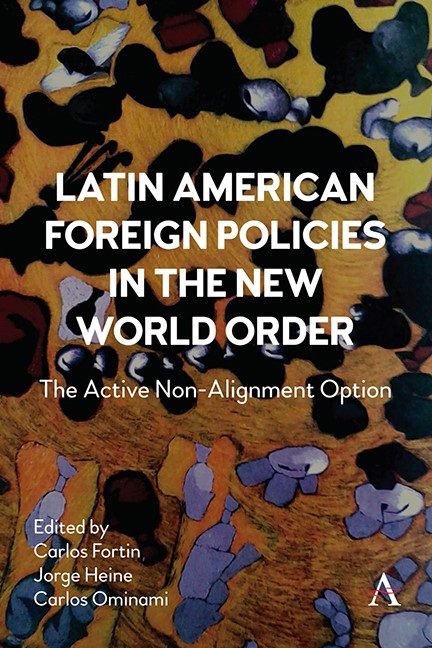Book contents
- Frontmatter
- Dedication
- Contents
- List of Tables and Figures
- Foreword
- Introduction: Active Non-Alignment (ANA) A Doctrine
- Part One The Emerging World Order
- Part Two Active Non-Alignment In The New Geopolitical Environment
- Part Three Active Non-Alignment in the New International Political Economy
- Part Four National Perspectives
- Conclusions—Implications of an Active Non-Alignment (ANA)
- Notes on Contributors
- Index
Foreword
Published online by Cambridge University Press: 15 November 2023
- Frontmatter
- Dedication
- Contents
- List of Tables and Figures
- Foreword
- Introduction: Active Non-Alignment (ANA) A Doctrine
- Part One The Emerging World Order
- Part Two Active Non-Alignment In The New Geopolitical Environment
- Part Three Active Non-Alignment in the New International Political Economy
- Part Four National Perspectives
- Conclusions—Implications of an Active Non-Alignment (ANA)
- Notes on Contributors
- Index
Summary
The concept of Active Non-Alignment (ANA) was initially proposed by Carlos Ominami in a text published in August 2019. The specific reference was to the Chilean case, but the call of “our only option is that of an active non-alignment that puts politics at the center of international action […]. We must defend multilateralism and international law with all our might” (Ominami 2019) was to Latin America as a whole—and even beyond.
The notion resonated. The Puebla Group, made up of former Latin American and European presidents and leaders, declared in its November 2019 Manifesto: “Our Latin America can only assume a position of active non-alignment putting the interests of our peoples first and ensuring uncompromising respect for our sovereignty” (Grupo de Puebla 2019, emphasis in original).
An article by the present authors with an initial approach to the subject was published in Spanish in Foreign Affairs Latinoamérica in July 2020 (Fortin, Heine and Ominami 2020a) and later reproduced in English (Global Policy, 2020), French (IRIS, 2020), and Mandarin (IISS 2020). A subsequent article was published in two international outlets (NUSO 2020; WSI 2020).
In August 2020, Chile’s Foro Permanente de Política Exterior, a think tank, organized a webinar on the subject, with the participation of six former Latin American foreign ministers from Argentina, Brazil, Chile, Colombia, Mexico, and Peru to analyze its viability and scope (FPPE 2020). The stimulating discussion that took place there confirmed not only that the proposal had struck a chord but also that there was the need to explore its content in more detail, both conceptually and in terms of its policy implications.
Thus, this book. Its central objective is to bring together a group of Latin American analysts, practitioners, and Latin Americanists to reflect on the scope and implications of the ANA option to further elaborate its meaning and relevance for the contemporary conjuncture.
The selection of authors and topics was made on the basis of three criteria:
1. A wide thematic coverage: The ANA option arises as a response to the conflict between the United States and China, which was triggered by essentially economic (trade, investment) and technological issues (5G, artificial intelligence, semiconductors), but has gone further, to include ideological and military dimensions. It is a hegemonic struggle with a wide scope. The ANA option aims to encompass the full range of foreign policy dimensions and their interrelationships with national development policies.
- Type
- Chapter
- Information
- Latin American Foreign Policies in the New World OrderThe Active Non-Alignment Option, pp. x - xiiPublisher: Anthem PressPrint publication year: 2023

